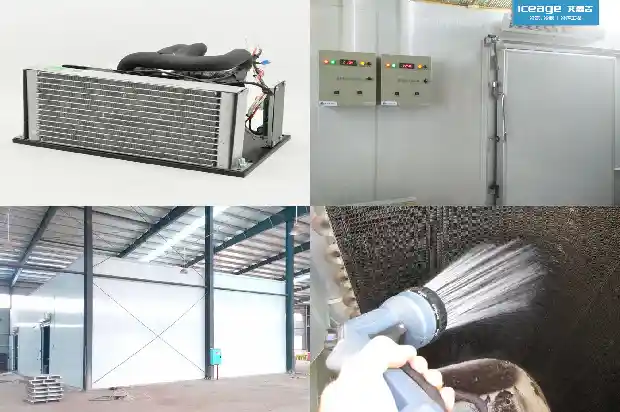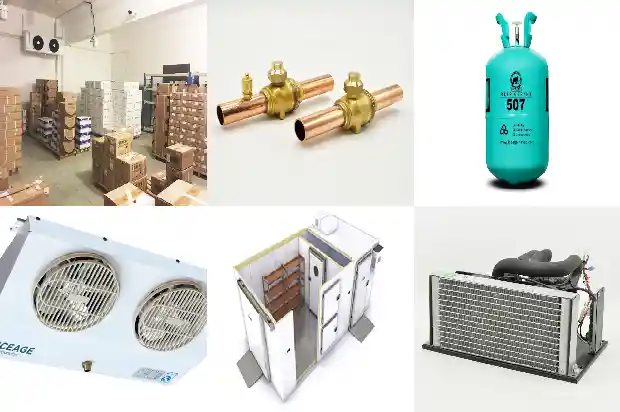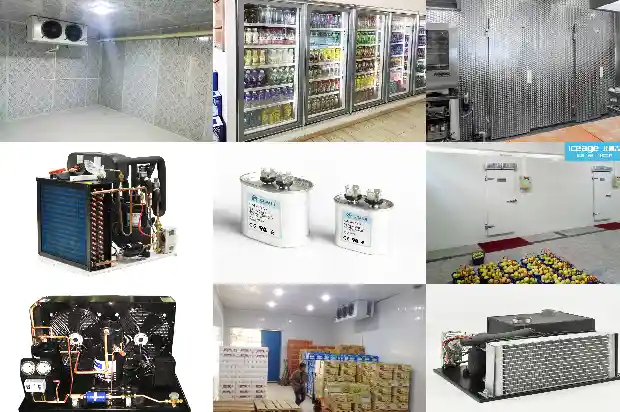Analysis of Common Faults in Compressor Overcurrent and Burnout
2024-12-15
- Reasons for Compressor Overcurrent
Briefly speaking, there are three main reasons for compressor overcurrent as follows: - The condensing pressure in the refrigeration system is too high.
- There is too much refrigerant in the refrigeration system.
- The compressor lacks refrigeration oil.
Let's explain them in detail below:
I. Poor Heat Dissipation of the Outdoor Unit
- Short circuit of the return and exhaust air of the outdoor unit: For example, if the outdoor unit is installed in a closed balcony, a narrow aisle, indoors or other unventilated places, and there are obstacles in front of the air outlet.
- The air volume of the outdoor unit is small and the heat dissipation speed is slow: For example, the condenser of the outdoor unit is too dirty or blocked by dust and oil stains, the rotating speed of the fan motor is slow, the capacitance of the fan becomes smaller, and the temperature around the outdoor unit is high.
II. Factors of External Power Supply Voltage
Both low and high power supply voltages can cause the working current of the compressor to be high. In China, the situation of low voltage accounts for the vast majority, especially during the peak period of electricity consumption. If the power supply voltage (i.e., the voltage before startup) is too low: Users should be asked to re-wire.
Check the voltage drop after startup: Under normal circumstances, the voltage drop is only a dozen volts. If the voltage drop is too large, the power cord should be thickened or rewired, and faults such as poor contact of the circuit should be eliminated.

Check the voltage drop after startup: Under normal circumstances, the voltage drop is only a dozen volts. If the voltage drop is too large, the power cord should be thickened or rewired, and faults such as poor contact of the circuit should be eliminated.
III. Refrigeration System Malfunctions
- Air is mixed into the refrigeration system: For example, to check whether there is air in the system. Air usually accumulates in the upper part of the condenser because it cannot pass through the liquid collector of the condenser. Generally, whether there is air in the system can be determined by the fluctuation of the system pressure. If there is air in the system, it should be evacuated and refilled with refrigerant again.
- Excessive refrigerant: The compressor will be in an overloaded state for a long time, which will eventually lead to the compressor overcurrent and trip. In this case, part of the refrigerant should be released.
IV. High Temperature of the Shell/Internal Parts
- Poor lubrication of the compressor: If the height difference between the indoor and outdoor units is greater than 5 meters and no oil return bend is made, or only an oil return bend is made on one pipe, the system cannot return oil smoothly. Due to the lack of lubrication, the temperature of the compressor will rise slowly during operation and finally lead to overheating and tripping.
- There are too many impurities and moisture in the system: This will cause the lubricating oil to deteriorate and carbonize and fail to play its normal role, resulting in a sharp rise in the temperature of the compressor and overheating and tripping. This situation generally occurs in machines that have been repaired or used for a long time. If the substances in the system are black, this situation definitely exists. At this time, the system should be cleaned with nitrogen, the compressor and capillary components should be replaced, and the system should be evacuated and refilled with refrigerant again.
V. Poor Cooling Effect of the Compressor
If there is too little refrigerant in the system, the temperature of the compressor during operation will be very high. The high-temperature coil is cooled by the inhaled refrigerant. If there is too little refrigerant, the system flow will be small and cannot meet 100% of the load of the evaporator, resulting in an increase in the suction superheat. Coupled with the small suction flow of the compressor, the cooling efficiency will be greatly reduced. Long-term operation in this way can lead to the compressor's thermal protection.
- Common Reasons for Compressor Coil Burnout
- Frequent Start-up of the Air Conditioner Compressor
During the start-up process of the air conditioner compressor, a step-down start-up circuit is generally provided, but the start-up current will still exceed the rated current by several times, and the temperature of the air conditioner compression motor rises very quickly. If the temperature setting of the air conditioner is improper, such as the refrigeration temperature being too low and the heating temperature being too high, this will cause the air conditioner compressor to frequently turn on and off, which will shorten the service life of the air conditioner compressor. - Frequent Start-up of the Air Conditioner Compressor
Poor power supply voltage quality, such as too high or too low voltage, has an adverse impact on the air conditioner compressor motor. Especially when it is used beyond the rated voltage range of the air conditioner compressor, it is the most improper. Long-term operation will make the air conditioner compressor motor in an inefficient and overheated state, resulting in poor insulation and burnout of the motor winding. In addition, unbalanced three-phase voltage or current will also increase the motor losses (iron loss and copper loss), make the temperature of the air conditioner compressor motor coil too high, improper protection of the overheater, burnout of the insulation of the air conditioner compressor motor, and lead to short-circuit burnout of the air conditioner motor coil. - The Refrigeration System Has Not Been Cleaned Thoroughly After the Compressor Burnout
For the air conditioning refrigeration system that has ever had a compressor burnout fault, the refrigeration system must be cleaned thoroughly. When the air conditioner compressor motor burns out, strong acid will be generated and remain in the system. If it is not cleaned up properly, when the new air conditioner compressor motor operates, the residual acidic substances will corrode the insulation layer of the air conditioner compressor motor and cause the new air conditioner compressor to burn out. - Insufficient Cleanliness of the Copper Tube System
It contains moisture, and moisture will also lead to poor insulation of the air conditioner compression motor. Moisture, refrigerant and refrigeration oil circulate in the system. After undergoing state changes such as high temperature and low temperature, acidic substances will be generated, which will further damage the insulation layer of the motor. After a long working time, the air conditioner compressor motor will burn out.

- Poor Cooling of the Compressor
The return gas temperature is too high or the return gas volume is too low, resulting in insufficient cooling of the compressor motor coil. This situation occurs more frequently in air-cooled heat pump units. Moreover, too high a return gas temperature will also lead to too high an exhaust temperature, causing a series of problems with the air conditioner compressor. - Faults of the Compressor Start-up Contactor
The contact resistance of the contactor is too large or sintered, causing short-circuit burnout of the air conditioner compressor motor, or poor contact of the circuit. A large starting current can easily burn out the air conditioner compressor. - Short Circuit Caused by Metal Chips
The metal chips mixed in the winding are the main culprits for short circuits and low ground insulation values. The normal vibration of the compressor during operation and the torsion of the winding under the action of electromagnetic force during each start-up will promote the relative movement and friction between the metal chips mixed between the windings and the enameled wire of the winding. The sharp-edged metal chips will scratch the insulation layer of the enameled wire and cause a short circuit.
Related Articles
- Analysis of Seven Reasons for Ice Formation in Computer Room Air Conditioners
- Analysis and Troubleshooting of Common Faults in Air - source Heat Pumps
- Analysis of 6 Components in Air - cooled Multi - split Systems
- Analysis of Advantages, Disadvantages and 34 Common Components of Multi - split Air Conditioners
- Common Causes and Analysis of High and Low Pressure Alarms
- Common Causes and Analysis of Compressor Thermal Protection
- Analysis of Causes for Safety Valve Leakage
- Analysis of Refrigeration Compressor Motor Faults
- Fault Analysis of Working Principle of Screw Chiller Unit
- Analysis and Treatment of Common Low-Pressure Faults in Chillers
- Analysis and Treatment of Common Low Pressure Faults in Chillers
- Water Cooled Unit Principle of Operation and Parameter Failure Analysis
- Basic Faults and Preventive Maintenance of Water - cooled Units
- Composition and Common Faults of Screw Refrigeration Compressors
- Common Faults and Solutions of Central Air - conditioning Chiller Units
- Common Faults of Industrial Chillers
- Common Faults and Corresponding Solutions of Chillers During Use
- Maintenance Methods for Faults in Screw Refrigeration Air - conditioner Compressors
